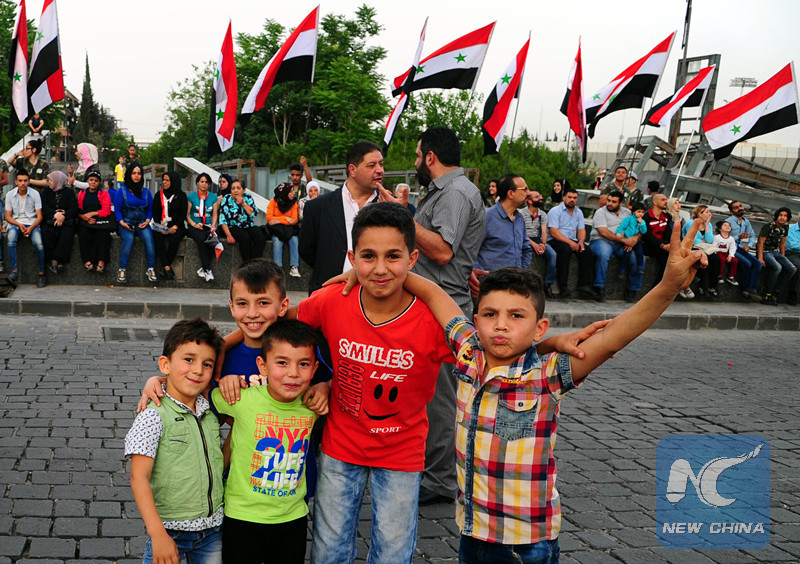
Syrians hold Syrian flags during a concert commemorating the Martyr's Day at al-Abassyeen square in Damascus, capital of Syria, on May 6, 2018. (Xinhua/Ammar Safarjalani)
SHARM EL-SHEIKH, Egypt, May 9 (Xinhua) -- Syrian Minister of Tourism Bisher Yaziji revealed on Wednesday that tourism indicators in his country have begun to improve especially in the last three years.
"In 2013 tourism declined by 92 percent...But over the past three years the rates have increased by 28-30 percent. This is an evidence of recovery," the minister told Xinhua in an exclusive interview during his participation in the regional conference of the World Tourism Organization in the Middle East held in the Egyptian resort city of Sharm el-Sheikh.
Yaziji said that the Syrian tourism sector suffered significant damage during the anti-terror war which started in 2011, adding that the losses of the sector reached 300 billion Syrian Pounds (around 580 million U.S. dollars) during the seven-year conflict.
The minister pointed out that the greatest damage in recent years was the result of terrorist attacks on mosques, churches and shrines, as well as targeting antiquities and monuments.
"Some tourist facilities were leveled to the ground, but we are restoring these facilities," he stressed. "The terrorists did excavations to obtain antiquities and sold them to finance their terrorist acts. They also destroyed them under the pretext that these antiquities and monuments are as idols."
He noted that the Syrian government is doing many restoration works and exerting great efforts to reduce the negative effects of these terrorist attacks on archeological sites as the Syrian army is continuing to liberate many areas from the grip of terrorist organizations.
"About 1,200 tourist establishments have returned to work in recent years," he said.
The percentage of hotel occupancy recently exceeded 90 percent, he said, adding it sometimes reaches 100 percent in seasons and never went below 60 percent.
Yaziji said the Syrian Ministry of Tourism has a very clear plan to show "the pulse of life in Syria."
"Our plan is continuing to achieve the purpose of reviving the tourism sector, not only on the entertainment side, but more importantly in the social and economic aspects," he said.
The minister also affirmed that the government is working hard on returning normal life to Syria through holding festivals and social and artistic events.
He stressed that Syria, despite all the damage it has been suffering, is rich with human heritage, adding that Syria used to attract about 8.5 million tourists before the war.
"Syria has more than 63 citadels and 10,000 archaeological sites. It also has all the tourism components. It is therefore very natural for the tourism sector to continue," he said.
Yaziji pointed out there has been a greater focus recently on domestic tourism as it constitutes 40 to 60 percent of the tourism sector in any country.
"The Syrian people realize the reality of what is happening in their country, and they are not affected by some hostile media. Syrian businessmen exert great efforts to complete their projects and investment in the tourism sector," the minister explained.
The minister stressed that investment in the tourism sector did not stop in his country, affirming that investors, including existing Arab ones, did not withdraw from Syria during the years of war.
"The investment situation in the tourism sector is good, and we are working on issuing an investment law that will be an important attraction in the coming period," he said, noting that the Syrian government has stood strongly with investors in wartime, and it will provide very large facilities to attract more investments to Syria after the war.
As for the Syrian-Chinese tourism cooperation, Yaziji said cooperation is expected to be great and satisfactory, but it will happen at the proper time.
"We have much love and appreciation of the Chinese people and government for their position on the Syrian war against terrorism," he revealed.
"We are very keen to ensure the safety of tourists who visited Syria in the past few years...we are now working to attract business tourism," he added.
Yaziji explained that during the coming period there will be a focus on business tourism with China, and some other tourism programs, stressing Syria has very important economic cooperation with China.
"We find outstanding efforts from the Chinese side to support economic cooperation, especially as Syria is on the period of reconstruction," the minister said.
The ongoing Syrian civil war broke out in spring of 2011 between the government forces, along with its allies, and various forces opposing the government, including the IS militants.
During the seven-year turmoil and military confrontations, Syria has witnessed large-scale devastation in various parts of its territories, with many foreign countries intervening in the crisis.
The Syrian government's troops have liberated most of cities, towns and villages captured by rebels and Islamist terrorists.
Since its eruption in March 2011, the Syrian crisis has claimed the lives of about half a million people and displaced and wounded over 14 million.

